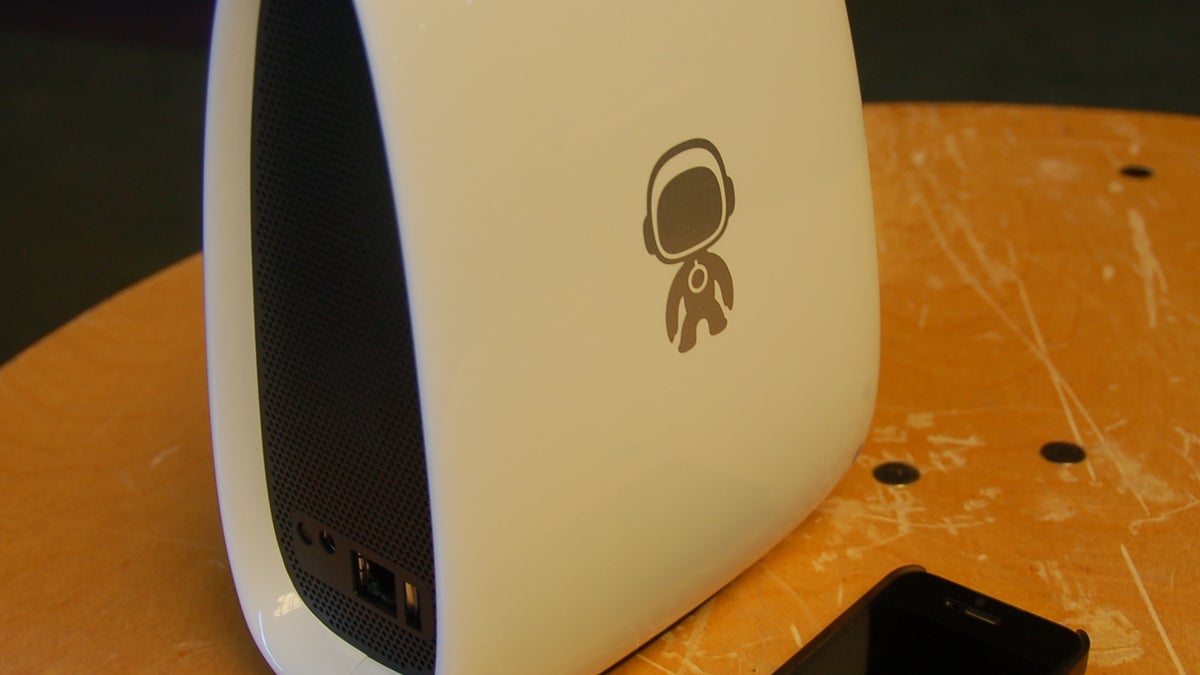Dropbox rival Space Monkey puts 'cloud' in your house
An intriguing combination of concepts from Dropbox, BitTorrent, and CrashPlan makes up a new, inexpensive cloud-storage provider.

SAN FRANCISCO--I keep writing off online consumer storage as a business (see CX: Good sync product, doomed market), but there's still life left in the model. One of the most interesting new twists, Space Monkey, is a weird blend of Dropbox, BitTorrent, and Crashplan that just might work over the long haul. The product was announced today at the Launch conference.
There are three key technologies making up this cool but strange product:
1. Space Monkey is a synchronizing cloud storage provider like Dropbox. What you store on your account is automatically replicated to other computers you own. Like Dropbox, Space Monkey will also give you a way to share your files with others, as well as smartphone apps for access to your stuff.
2. Like CrashPlan, Space Monkey uses storage devices located at its users' premises, not in data centers paid for by the company. When you sign up for Space Monkey, you get a physical networked hard disk with 1TB of storage free for you to use. It's actually a 2TB drive; the rest gets used by other people on the system.
3. And like BitTorrent, Space Monkey distributes all your files into little pieces (encrypted, of course) that are sent out to other Space Monkey devices on the Internet--conceptually, that is, since Space Monkey does not use any BitTorrent protocols. So when you want to download a file from a location other than your home network, the Space Monkey setup will piece it together from your closest network neighbors. This gives data in the Space Monkey "cloud" redundancy and reliability--in theory, anyway.
Do we need it?
But what's wrong with Dropbox? Everyone loves it, right? Why do we need the complexity of something like this?
Money, honey. Cloud storage is expensive. Dropbox, for example, is incredibly expensive compared with just buying a hard disk, and you can't even get a standard plan that gives you more than 100GB of storage. I keep pressuring the CEO of SugarSync, the sync service I use, to reduce prices for heavy users, since hard-disk pricing trends down over time. But she tells me that supporting managed, replicated, virtual hard disks in the cloud is indeed expensive and that it wouldn't make economic sense for the company to reduce its prices.
Space Monkey takes all these hardware costs and bandwidth, and shunts them out to its users. The networked hard drives they send out use inexpensive consumer-grade parts. The bandwidth costs are absorbed into users' ISP relationships. The company does have to run a complicated server farm to coordinate all the distributed pieces of the network, but nothing that requires the massive scale a traditional cloud provider takes on.
Co-founder Alen Peacock told me that Space Monkey will charge users $10 a month for 1TB of storage, or "half what Dropbox costs with 10 times the storage."
Also, when users are on their home network, performance will be superior to traditional cloud systems, since all data transfers are local. Space Monkey will distribute files to other peers (in pieces) in the background.
There's a catch. Several, in fact
There are serious challenges to this approach, though. Such as bandwidth. The era of unlimited bandwidth for consumers is over, and Space Monkey can't risk pushing overage fees on or throttling its users' accounts. As it turns out, what the ISPs don't want to pay for (and why they limit bandwidth), is inter-ISP traffic. Data flowing between users on their own networks doesn't cost them nearly what external data transfer does. So Space Monkey primarily "peers" users with others that are on the same ISP, and the founders are in talks with the ISPs to get that intra-ISP traffic excluded from the counts that would trigger overages.
Then there's the configuration issue. This product has to punch through home firewalls easily, so setup doesn't require anything more than plugging in power and Ethernet. The founders say they've licked this. We'll see.
And, of course, security and privacy. Nobody really wants their data, or even pieces of it, living at the homes of people they don't know. The founders say their inherent encryption renders the slices of data unreadable on other users' hard disks, and that it's only reconstructed at the client computers. Let's hope they're right.
The biggest challenge, though, may be the diminishing need individuals have for folder-based file storage. Apps are beginning to provide their own synchronized storage, and media is increasingly streamed as needed, not owned. To this objection, Peacock replies that Space Monkey is building a storage infrastructure that could be rented out to other app providers, the same way S3 is--but for less money, owing to the distributed nature of the system. The consumer-facing Dropbox competitor is just one product that runs on this system.
Without the consumer-facing part of the product, I don't see how the hardware ends up in users' homes, but at least the founders are thinking of life beyond this initial launch.
This is an interesting, high-risk play. The consumer proposition may be clear (more storage for less cost), but the company is so exposed in other areas that we won't be able to call Space Monkey a success until well past initial user adoption.
Speaking of bizarre storage ideas, see also Bitcasa moves your hard drive to the cloud.

